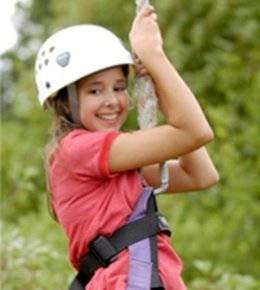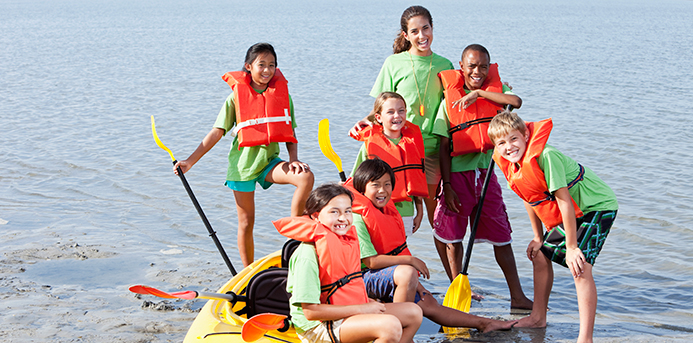 Are your kids ready for an overnight camp? If you’re wondering what the magic age is for sleep-away camp readiness, you might be disappointed with the experts’ answer.
Are your kids ready for an overnight camp? If you’re wondering what the magic age is for sleep-away camp readiness, you might be disappointed with the experts’ answer.
“The most important thing to know is that there is no magic age for readiness,” says Dayna Hardin, owner/director of Lake of the Woods (girls) and Greenwoods (boys) camps in Decatur, Mich.
Jameson Brenner agrees.
Now a freshman at Glenbrook South High School in Glenview, Jamie first took off three years ago for Lake Owen, an action sports camp for skateboarding, BMX, inline blading, gymnastics and cheerleading in Cable, Wis. As Hardin does, Jamie believes each kid is different and ready when he has some independence under his belt.
“Some children start showing an interest in camp at 9 or 10 … but that doesn’t mean that there is something wrong with your child if they show no interest until they’re 13,” says Hardin, who is also president of the Midwest Association of Independent Camps, serves on the national board of the American Camping Association and co-founded SCOPE Midwest which provides camperships to underprivileged children.
One sign that your child is good to go, says Hardin: “Showing interest is the first step to readiness.”
Isabel Glass of Highland Park did that when she was 7. She had an older brother who had already been going to sleep-away camp and her parents had taken her to “post camp,” the time when camps open their doors to families after their summer-long campers’ departures and before school starts.
“It’s really, really fun and great exposure for kids to camp,” says Isabel’s mother, Martha Glass.
After those post camp stays, Isabel let her parents know that she really wanted to go.
“It’s got to come from the child” is Glass’ advice.
Still have doubts? Hardin suggests you consider:
1. Is your child able to handle his or her personal care? According to Hardin, she should be able to handle basic things such as independently washing and brushing her hair, brushing her teeth, tying shoes and keeping track of belongings.
2. Does your child really understand the time frame of the camp stay? Sit down with him, look at a calendar and mark off the length of time of the camp program. Then mark that time with your child until the period is over. Or just showing him visually what a month is can be helpful.
3. Explore your child’s concerns. “Really talk with your child,” Hardin says. “As a parent, you know them better than anyone. They all have something to worry about. … You have to put the pink elephant in the room. If she has a fear of thunder, have a conversation: [Ask her] ‘What will you do if you’re at camp and there’s a thunderstorm.’ And then help her explore options that would be available to her. Just make sure that she understands that the situations that come up at home can come up at camp.”
A Successful Stay Away
Once you make the decision that your child is, in fact, ready for an overnight camp, ensure he or she has a successful stay with the following tips:
1. Write letters—the old-fashioned way. Most camps have one-way e-mail systems, but “kids still want letters. And the e-mails,” Says Dayna Hardin, owner/director of Lake of the Woods (girls) and Greenwoods (boys) camps in Decatur, Mich.
2. Be very thoughtful when you’re writing your letters. Ask good questions about the child’s camp experience rather than focusing on what you’re doing at home.
3. Most of the time, it’s the parents who have a hard time letting go, Hardin says. “Partner with the camp in this experience,” she says.” You can call the camp, talk to the director, cabin counselors. Whatever it takes, do it. Because if you’re not comfortable with the experience, your child can sense that.”

